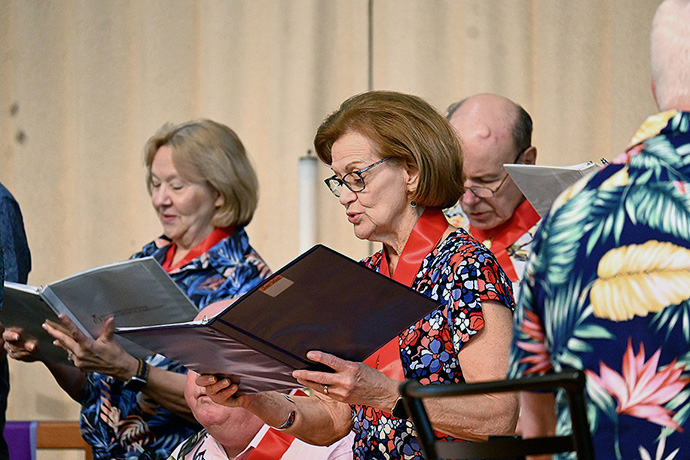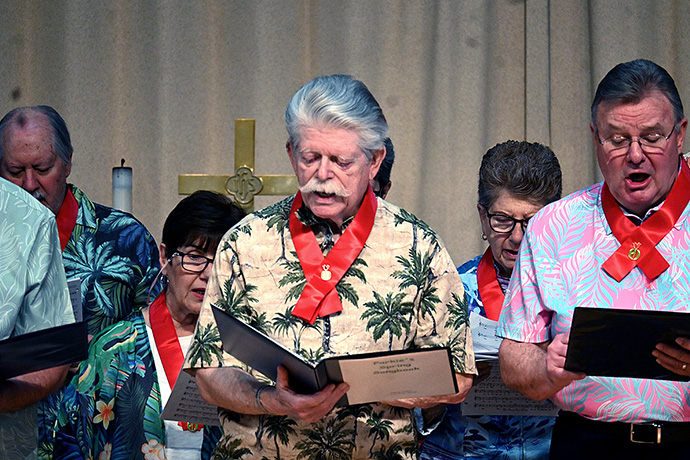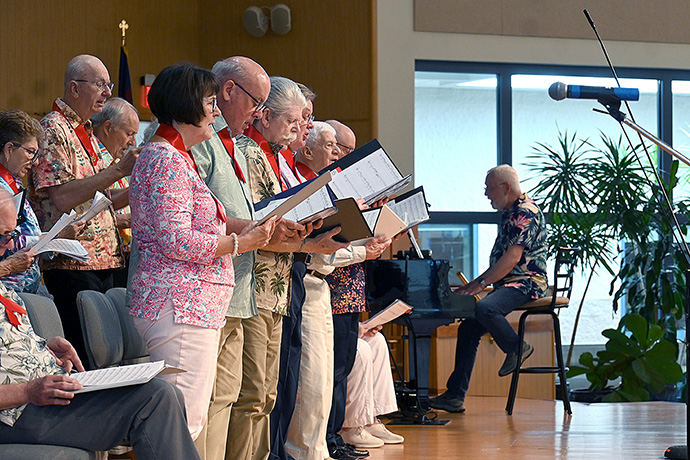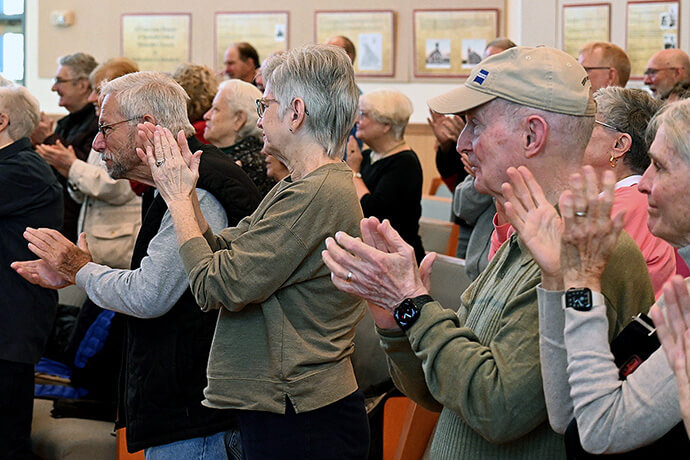Key points:
- The Parkinson’s Education and Support Group of Sussex County Choir recently performed for the second time with a selection of summer songs at Epworth United Methodist Church.
- Singing is a way people with Parkinson’s can stave off progression of the disease.
- One choir member converted to United Methodism after enjoying her time rehearsing at Epworth.
It’s hard to take anything too seriously while listening to 25 adults singing “Itsy Bitsy Teenie Weenie Yellow Polka Dot Bikini.”
But as the silly song — a No. 1 hit for Brian Hyland the summer of 1960 — rang out April 10 in the bright, modern sanctuary of Epworth United Methodist Church, the singers marked one more day in their serious fight against Parkinson’s disease.
The concert had a beach theme. Other songs performed included “Dock of the Bay,” “Sea Cruise” and “Love Letters in the Sand.”
“You can’t sit in the corner and die,” said Rose Verona, a member of the choir. “My name is not ‘Parkinson’s Rose Verona.’ My name is ‘Rose Verona,’ who happens to have Parkinson’s.
“I tell people, ‘Do not define yourself by this disease. Fight it.’”
The choir started two years ago when Amanda Peters, president of the board of the Parkinson’s Education and Support Group of Sussex County, approached the director of music at Epworth to see if he had any interest in leading a choir of Parkinson’s disease patients.
“Speech is part of our exercise bucket because speech is muscle, and one of the ways that you maintain your speech is through the chorus,” Peters said. “So we wanted to try and get a chorus started.”

Doug Yetter of Epworth already had the church choir, a praise team and a 100 Voice Community Choir on his plate when he was approached.
“He was very, very interested,” Peters said. “He did some research, he looked at his budget of time that he could give, and he came back and he said, ‘Yes, I would love to do this.’”
Yetter said he knows the benefits of music therapy firsthand.
“I had performed in theaters for a long time, and then I moved to piano bars and ended up damaging my voice pretty badly,” Yetter said. “So the therapy that I had got me more interested in trying to do this.”
Nineteen singers showed up at the first meeting in 2023. Now, up to 42 singers practice once a week at Epworth and concerts are performed three times a year. The next concert is set for July 24.
Since Parkinson’s is a degenerative neurological condition, those who get it experience many of the same symptoms, but at different paces. Keeping active though singing and other physical activity can hold off the progression significantly.
“Speech will decline when you have Parkinson’s,” Peters said.
Vocal projection, enunciation and even the desire to speak are affected.

New Parkinson’s patients usually start with LSVT — Lee Silverman Voice Technique — which has two focuses. First it works to improve motor skills through balance, walking, posture and strength exercises. The second aspect is improving speech and voice volume by encouraging patients to speak louder and more clearly.
“That’s (typically) covered by your insurance,” Peters said. “But then there’s daily maintenance that you do once the therapy is over.”
There are less visible afflictions that happen because of Parkinson’s, Verona said.
“The most common for everybody that has Parkinson’s is constipation,” she said. Problems swallowing and breathing are also common, as is difficulty walking. And then there’s the mostvisible Parkinson’s symptom, the tremors and shaking.
“Some of them, they’re shaking so much that they can’t even hold a cup, and then they have to have the deep brain stimulation, and there’s a lot of new things that are coming out,” Verona said.
Deep brain simulation is a surgical procedure where electrodes are implanted in the brain. The electrodes shoot electrical impulses, which has proved helpful treating medical issues such as tremors.
Singing is a much less invasive treatment.
“This is our second presentation that we’ve done,” Peters said. “Everything with Parkinson’s is ongoing maintenance, so this program is designed to be never ending, always reoccurring, so that the projection of voice is not lost.”

The social aspect of choir participation is just as important, she said.
“Parkinson’s will actually affect your desire to participate in life,” Peters said. “All of our programs are group, so, of course, social is a large part of that. Sometimes you pull back from community because it’s overwhelming and it takes more time than you think you can budget.
“So the social aspect of the chorus has been very, very good for our members.”
Subscribe to our
e-newsletter
Jim Holdridge, whose successful business career ended because of Parkinson’s, said singing in the choir helps fill his day and will hopefully slow progression of the disease.
“I just thought I was clumsy, falling,” Holdridge said. “I was tested for that … and they determined that I had Parkinson’s, coupled with congestive heart failure.
“It is what it is,” he added. “Can’t whine about it.”
For Verona, raised as Catholic, the Parkinson’s choir led to her to becoming United Methodist and joining Epworth.
“What I love about Methodism is they walk the talk. They actually do the things I think everyone should do, like getting people fed,” she said. “There’s divas everywhere, and there’s passive-aggressive (people) everywhere, but I see very, very little of it here.”
Music director Yetter gave Verona a Bible, and they started a dialogue.
“I started reading that Bible,” she said.
Soon she had two new families, one based around Parkinson’s and the other her faith. She is one of four Epworth members in the choir.
“I talked with Doug (Yetter) about the people here, and I said, ‘Oh God, I guess you’re telling me this is my home,’ and it is my home. This is my family now.’”
Patterson is a UM News reporter in Nashville, Tennessee. Contact him at 615-742-5470 or [email protected]. To read more United Methodist news, subscribe to the UM News Digest.





